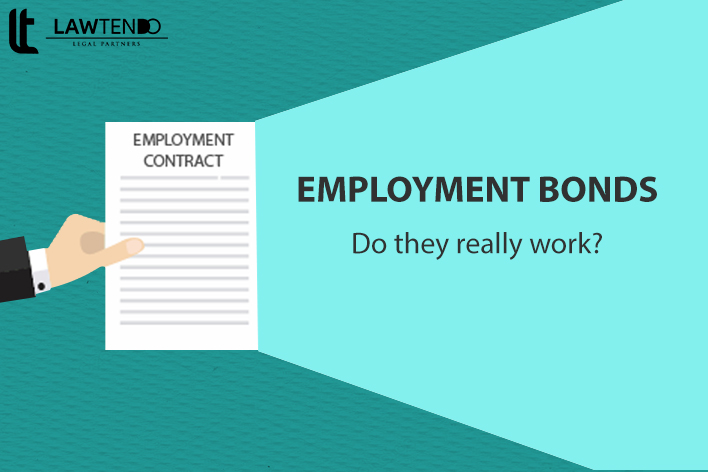Employment bonds and their validity in India

Date : 13 Nov, 2019
Post By Bhupender Tanwar
A bond issued by an employer to an employee stating the terms and conditions that both the parties must adhere to is known as an employment bond. An employment bond includes all company policies and provisions and the period when the work started till the work ends (if applicable). If the employee does not hold his or her end of the bargain with an organization as written in the contract, then they may face serious charges along with compensation that the company may ask upon non-compliance with the bond. If today’s employment scenario in India is to be believed, having an employment bond for both the parties could prove for the general and smooth functioning of the entire company and ensures safety to both the employer and the employee by providing them with a legal right to take the matter to court upon non-compliance by either party. However, under Section 27 of ICA, an employer is not allowed to put a restriction, directly or indirectly forcing the employee to work for the employer or restrict the employee to work for another competitor. Thus, under Section 27 of the Indian Contract Act, 1872, it is stated that any agreement made in restraint of trade and profession is considered void depending upon the circumstantial evidence. Bonded labour is also outlawed under the Bonded Labour System (abolition) Act, 1976 according to which no person shall be required to stay for a particular tenure at a company out of compulsion. This also means that 1 or more years of bonds that the employer’s sign stands null and void according to the laws mentioned above and no lump-sum amount could be charged on breaking such bonds. In certain cases, the company may withhold important documents or the full and final settlement of the employee which is against the law and the company is not allowed to do so if an employee leaves an organisation. An employee is allowed to leave or resign a company even after signing an employment bond at any time by properly complying to the regulations of the company and any restriction imposed by an employer upon an employee that compels them to work for a time period or restricts them from joining a competitor is void under the Indian Law. Restrictions that company’s in India usually put are as follow: 1. Restriction on joining any competitor 2. Restriction on joining another employer of own will 3. Compelling the employee to work for a certain period without will How can an employment bond be validated? Firstly, the bond should be duly signed by both parties with mutual and free consent. Secondly, the conditions put forward in the bond should be reasonable and the bond has to be executed on a stamp paper of appropriate value. Thirdly, the bond must carry the time and technology (money) invested in any employee to be claiming that value in future In case of breach of employment bond : An employer can avail compensation in case of any dispute or breach of the bond by an employee. A legal suit would be filed at a respective court in case the employee refuses to abide by the same. The court will then decide if the terms and conditions of the contract are appropriate and reasonable. Based on their decision, the employer can claim compensation. If you are an employee in need of an experienced employment lawyer to understand how you can get out of the signed bond or what things you must know before signing any bond, kindly contact us at +91 967163366 or write to our legal consultants for full and detailed advice.





